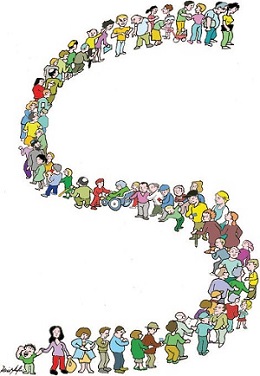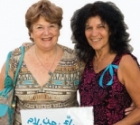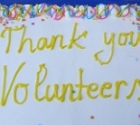
Illustration by Denis Shifrin
"It is the inherent right of every citizen in the homeland to wait in a line for the services the nation promises to provide. That same citizen also has the right to wait in line only for the sake of waiting in line." Theodore Herzl, Zionist Congress, Basel
While tree planters were planting and farmers were farming, I, too, was helping build the nation. Of course I didn't know it then but now in retrospect I see it quite clearly. I was doing my Zionist share by waiting in line. Yes, dear friends and fellow citizens, waiting in line is a task worthy of patriotic respect. I do not fear contradiction when I state that every aspect of shifting your weight from right leg to left leg and back again, behind a person or in front of a person, deserves our admiration.
Like many things we lay claim to, we can also point to the tradition of waiting in line as uniquely Israeli. Grouping people in an orderly fashion echoes back to biblical times: the Israelites waiting in line for Moses to come down from Mount Sinai, the lines massed on the shores of the Red Sea ready to cross, and the line of Persian beauties, including our own Esther, waiting to get the thumbs up from Ahasuerus.
From the very moment in 1968 when I landed in Israel, I found myself on line. It was not an immediate decision because foolish innocence had me questioning the nature of the line I saw forming. But very quickly I learned to grab a position on the line, and then ask questions. After all, you can always leave a line, but you can't always get on one. This is because the powers that be construct lines, a line is an artificial act of the bureaucracy; it is squashing a large public into a small space with only a requisite number of human beings per day on a specified line. I have heard it told that there is a Manual of Line Management - Page 5 states: "A line is the shortest distance between the entrance and the counter."
Having never stood on the sign-up line for ulpan, I learned survival Hebrew on line at the Kupat Holim, Post Office, vehicle registration, the shoemaker, the baker, the candlestick shaker. My on-site lessons had a logical order: First I learned the numbers as I explained what number I was on line. I learned the pronouns "he" and "she" as I pointed to the individual heading the line, the words "first" and "last" clarified any doubts caused by my heavy accent. When asked how long I'd been waiting I learned the words for "minutes," "hours" or "half a day." I acquired the Israeli "tsk-tsk," and the what-can-we-do shrug of my shoulders. People temporarily left the line only after striking an agreement and receiving permission from three to four standees in their immediate vicinity. The reason given for creating a "space" had to be linked to life or death events; even when I was pregnant, my stomach was carefully scrutinized for signs of a pillow. Sitting down to rest on a corner bench was considered a sign of weakness and your place would not be held for you. After all, we won a war in six days; surely standing for six hours was not expecting too much from the ordinary citizen. All of this was before the mechanization of the line.
When that happened the numbered list came into being. This was the first attempt at changing the anthropological status of the ur-line. A sheet of paper, clearly numbered, was tacked to a closed and locked door. Hanging politely on a string from the thumbtack was a pencil. Potential visitors were requested to write their names next to a number and theoretically return when the office opened its door and their name was called. It didn't take me long to understand that if I unfolded a cot and slept near the mythical door I could be the first to write my name when the numbered sheet of paper was tacked up. I felt no shame in my eye doctor seeing me deshabille this way. After all, he was checking my astigmatism, not my pajamas.
Though winter rains shut off traffic lights and excessive summer heat causes electricity shortages, the line has become a blitz marvel of hi-tech. Now "on-line" means something quite different. As a standing society, we moved at lightning speed from thumb-operated ticket dispensers to moving screens, automated voices and choice of language for our waiting intervals. As in all scientific advances something has been lost. The waiting room, the lobby, the entrance area are now spaces of quiet meditation, each individual assured by the flashing number on the wall that he or she will be received and served. Gone is the chance to bond with your fellow Israelis, learn Hebrew and have fellow line-waiters diagnose your medical symptoms even before the doctor sees you. Most importantly, with the near disappearance of the line, gone is the opportunity to acquire the healthy cynicism that every Israeli needs to survive. That happens when the person at the back of you whispers – "This isn't the end, there's another line on the other side of the door." And all of us on the line laugh because we know that person is right.
 Chanukah 5777
Chanukah 5777 Advertisers Directory 187
Advertisers Directory 187 ‘Give Peace a Chance’ Duo at Ceremony
‘Give Peace a Chance’ Duo at Ceremony A new website in English - on Volunteering - Launched in Israel
A new website in English - on Volunteering - Launched in Israel Help Needed for Abused Horses and Donkeys
Help Needed for Abused Horses and Donkeys Heather's Heseg
Heather's Heseg Pnina Moed Kass
Pnina Moed Kass